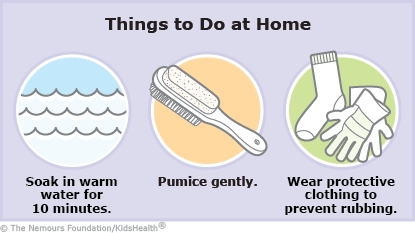Calluses and corns are areas of thick, hard skin. Treatment for corns and calluses includes basic home care, avoiding what caused them, and sometimes medicine that's put on them. Here's how to care for your child.



The callus or corn:

What causes calluses and corns? These form in places where there is a lot of repeated rubbing. Calluses often form on the palms, fingertips, heels, balls of the feet, and outside of the big toe. Kids who play guitar, do gymnastics on bars, or wear shoes that don't fit well may get them. Corns often form on the toes or bottoms of the feet. They're common in kids who wear tight shoes or shoes that don't fit well.
Do calluses and corns always need treatment? Calluses can protect the skin and prevent it from getting irritated. If your child got their calluses from a sport or musical instrument, they may not want them to go away. Calluses don't cause any harm and don't hurt, so it's OK if someone decides not to treat them. The calluses will just stay as they are or get bigger.
Corns usually hurt, so most people decide to treat them.
Can calluses and corns be prevented? Most calluses and corns are on the feet. So to prevent them, your child should:
If needed, a podiatrist (foot doctor) or orthopedist (bone doctor) can make special insoles to put in shoes to prevent calluses and corns.